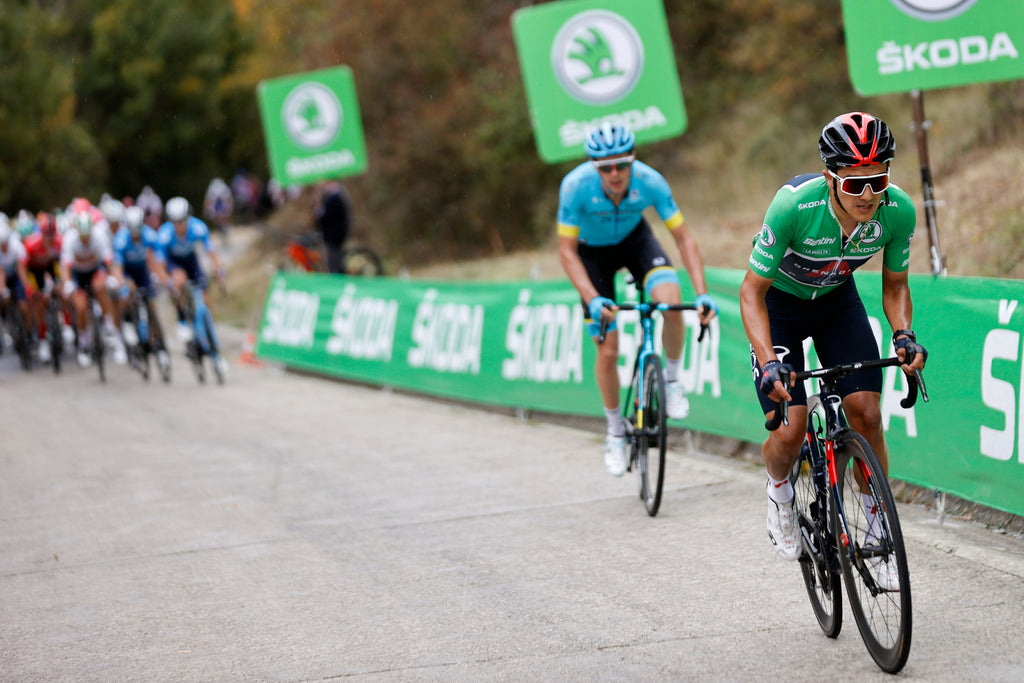The final WorldTour race of the season finishes with “a worthy winner”. Though Roglic gave up 21 second to Richard Carapaz on the Alto de la Covatilla, the 30 bonus seconds of advantage he’d gained in the previous 16 stages was enough to keep the red jersey on Slovenian shoulders ahead of the procession into Madrid.
Truth be told, “worthy” is a label that likely would have been applied to any one of the top four placed riders. Aside from the actual act of winning, which is usually a reasonable indication that a rider has rightfully earned their result, there are usually other factors, more personal to the individual that come into it as well.
For more content from Inside the Peloton, subscribe to Rouleur for £7
Had it been Carapaz we might have referred to the way he has taken more than one for the team this year. The Ecuadorian was set to lead Ineos at the Giro d’Italia, with Tao Geoghegan Hart on domestique duty, before being called up late in the day to take a team role himself at the Tour de France. There he played the ultimate equipier, without complaint, even after their general classification lamp was extinguished. The image of him rolling up to the line with Michal Kwiatkowski, allowing his team-mate to go half a wheel over it, is one which will live on long after this season is over and we begin thinking about the next.
A first Grand Tour win for Hugh Carthy would have been - will be, one day - welcomed as worthy in no small part by dint of his nationality. Brits love a Brit, especially one as straight talking as Carthy. But cycling fans in the race’s host nation would likely have been applauding it as well. The Preston-born rider enjoyed two seasons at Caja Rural–Seguros RGA and has spoken of his fondness for La Vuelta. It would, he told Mitch Docker last week, have been a great pity for Spain’s cycling supporters had the Vuelta not gone ahead. It might occupy third spot in the Grand Tour hierarchy but for Hugh, you sense, it is no lesser race than Le Tour.
As for Dan Martin, well, he’s Dan Martin, isn’t he? Without a Grand Tour top ten finish for more than two years, and having never finished higher than sixth in any, most had given up on any residual idea of the Irishman as a three week challenger, or a likely winner at this level again. Based on the emotional interview he gave after winning stage three, he seemed he'd all but accepted that himself. We do love a rider who sheds a tear or two, don’t we? We also appreciate a late career bounce-back.
For the ultimate victor, Primoz Roglic, it can come down to only one thing. Few will forget the look on his face as he crossed the line at the top of La Planche des Belles Filles back in September. “Shell-shocked” sums it up. It was one of the few occasions we’d seen him appear vulnerable, or show much in the way of emotion. Had it not been for that defeat, his second successive Vuelta might have meant little, would have been written up as a robotic result, rather than a redemptive one. Talk about getting knocked down, and getting back up again.
Four riders; four different nationalities; four different teams and yet most of us, no matter where we’re from, where our loyalties might lie, could find an excuse to feel each one was just. A perfunctory Twitter trawl will find the rider who prevails in almost any race labelled as “worthy”. Strade Bianche? Check. Milan-Sanremo? Yup. (Wout van Aert is pretty popular in that respect.) Julian Alaphilippe’s World Championship winning ride really hit fans in the feels.
It might be to the sport’s commercial detriment but it’s one of the most likeable aspects of cycling fandom that it lacks much of the tribal fervour of other sports. That we look for - and frequently find - worthiness in any given outcome. 
Yet what makes a win worthy seems entirely arbitrary. It seems we simply know one when we see one.
Of course, the notion of a worthy winner implies the existence of its negative: an unworthy one. So what does make someone an unworthy winner?
The obvious answer is any who has cheated, but does an illegitimate victory count as a victory at all?
A better example might be one where the rider in question was thought to have exploited the work of others might count. Ruben Guerreiro’s stage of the Giro last month wasn’t the most popular. It’s not easy to think of many more.
Twitter helps us here, too, though a keyword search summons just two results: Alexandre Vinokourov’s Olympic gold in 2012 and Nibali’s 2014 Tour de France. The latter seems less about him than his team, which happened (still happens) to be that of the same figure who won the aforementioned road race in London. Read into that what you will.
It says something similarly special about our sport that there seems to be so few.
































